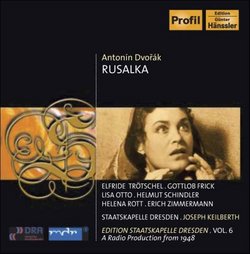| All Artists: Antonin Dvorak, Joseph Keilberth, Dresden Staatskapelle, Elfriede Trötschel, Lisa Otto, Ruth Lange, Erich Zimmermann, Helmut Schindler, Kurt Preuß, Edith Hellriegel, Eva Fleischhauer, Käte Höfgen Title: Dvorák: Rusalka Members Wishing: 0 Total Copies: 0 Label: Profil - G Haenssler Original Release Date: 1/1/2006 Re-Release Date: 6/20/2006 Genre: Classical Style: Opera & Classical Vocal Number of Discs: 2 SwapaCD Credits: 2 UPC: 881488603125 |
Search - Antonin Dvorak, Joseph Keilberth, Dresden Staatskapelle :: Dvorák: Rusalka
CD Details |
CD ReviewsThe Sonic Resurrection of a Historic 1948 Performance J Scott Morrison | Middlebury VT, USA | 07/08/2006 (4 out of 5 stars) "This German-language production of Dvorák's fairy-tale opera 'Rusalka' comes from post-war Dresden and marks one of the first recordings and broadcasts following the fire-storm destruction of the heart of Dresden by Allied bombers in early 1945. It stars singers of the Dresden Semperoper who had survived the war. Most familiar of them is basso Gottlob Frick as Rusalka's father and soprano Efriede Trötschel in the title role. The conductor is Joseph Keilberth, leading the Staatskapelle Dresden who also had functioned as the pit orchestra of the Semper Opera before the war. Since all the suitable auditoria in Dresden had been destroyed, this performance -- first broadcast live over Mitteldeutsche Rundfunk and then recorded, again live, a few days later -- took place in an improvised 'studio' in the reception area of the German Hygiene Museum. Most of the included booklet describes how the audio was set up in this improvised setting and how the master tapes were recovered and renovated by modern sound engineers. Very little is said about the opera itself, except for a brief synopsis. There is no included libretto. Further, the Czech original had been altered considerably for its German-language production, bringing it more in line with Hans Christian Andersen's 'The Little Mermaid.' All this leads one to conclude that this production, whatever its musical values, is more for the historically minded than for the average opera lover.
As for the musical performance itself, it has much to recommend it. First, the sound is amazingly good considering the state of the master tapes when they were found and restored in the early 1990s after German reunification. Elfriede Trötschel, a light lyrical soprano much praised for her Mozart (Zerlina, Susanna) and Strauss (Sophie) sounds appropriately young and naïve, yet ardent, in her portrayal. Her 'Hymn to the Moon' does not makes us forget Renée Fleming or Edita Gruberová, but it is nonetheless lovely. Gottlob Frick, a basso with an endearingly provincial German pronunciation, is a believable Wassermann (as he's called in this German version) whose distress at his daughter's wish to become a human is moving. A surprise to me was a previously unknown tenor, Helmut Schindler, as the Prince. He has a clear, penetrating Germanic sound that reminds me of Rudolf Schock but with a bit of strain at the top. He sounds heroic and desperately in love with Rusalka. Jezibaba, here called 'Die Hexe', is portrayed with cunning and fire by contralto Helena Rott. And not surprisingly the Water Sprites sound, in German, like light-weight Rhinemaidens! Keilberth's conducting is neatly controlled. The sound of the orchestra is a bit recessed due, one suspects, to the acoustical difficulties in the recording venue. This is clearly not recommended as a first recording of 'Rusalka.' I'd go for the Mackerras/Heppner/Fleming version for that. But it might be appealing to those interested in post-war German recordings and in the particular singers involved. Scott Morrison" |

